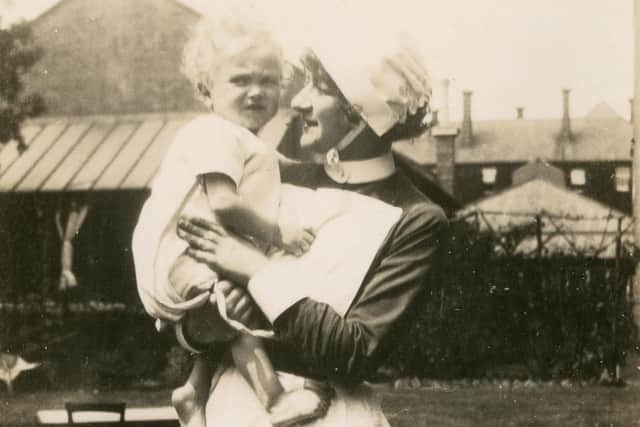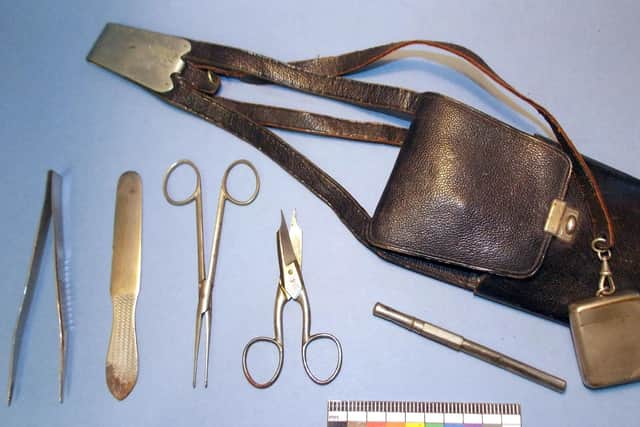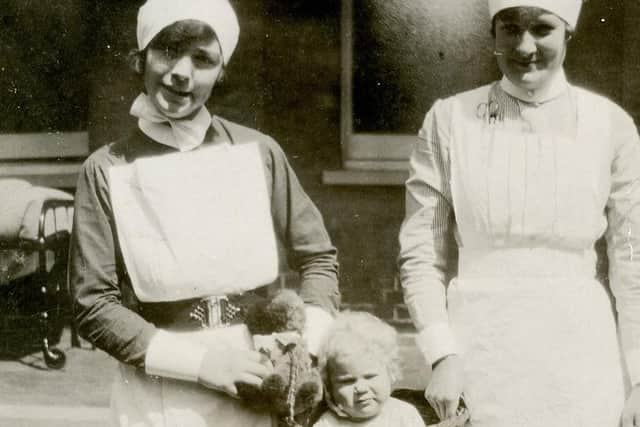Early days of nursing in West Sussex
and live on Freeview channel 276
Prompted by the 200th anniversary of the birth of the founder of modern nursing, Jeremy Knight, Horsham museum and heritage manager, has been searching the archives to find out how the work of Florence Nightingale impacted on the town.
Mr Knight decided to mark her birthday, May 12, 1820, by looking at some incidents involving nurses in Horsham, including a key figure in the First Aid Nursing Yeomanry.
Advertisement
Hide AdAdvertisement
Hide AdHe said: “Back in the 18th century, the town had a pest house or isolation building, where if you had contagious diseases you stayed. Unfortunately, we know nothing about how it operated.


“In fact, there is little mention at all of nursing till after Florence Nightingale set up her nursing school in 1860, with the first nurses being trained by 1865. This led to an understanding of the professionalisation of nursing.
“It was probably this and the discussion of it in the media of the time that led to the creation of the Horsham Nursing Association in 1878.”
Although Horsham had a local board of health and a number of doctors, the town did not have a hospital. The workhouse had one but not Horsham, and therefore the sick had to be tended in their own home.
Advertisement
Hide AdAdvertisement
Hide AdMr Knight said: “If the patient couldn’t go to the hospital, then let the hospital go to the patient, and so in 1878 Horsham Nursing Association was formed.”


As the Parish Magazine of 1884 noted, though, it was ‘hardly known or appreciated sufficiently’.
Mr Knight said: “It was felt by a few ladies of the town that the poor of the town needed the ‘skilled and competent’ services of a nurse. They raised funds to pay for one, who lasted a year, followed by Mrs Chatfield, who was still in post in 1884. In 1882, she nursed 14 patients, in 1883 24, some of whom she had looked after in 1883.
“The set up was simple. Application was made for the nurse to the committee member, the nurse cost 1s a week, though daily visits could be made at 3d a day. The nurse then boards with the family and ‘always does all in her power to make their homes and families comfortable’.”
Advertisement
Hide AdAdvertisement
Hide AdThe association in 1883 bought through donations an invalid bath-chair. The success of the scheme meant that by 1886, they could have two nurses.


It was around this time in 1882, Lilian Annie Margareta Franklin was born, the only daughter of Horsham wholesale merchant William Franklin.
In 1909, Lilian joined the First Aid Nursing Yeomanry, or FANY, which had been founded two years earlier. Women aged from 18 to 30 provided their own horses, uniform, paid 10s enrolment fee and 6s a month subscription.
By 1910 the organisation had fragmented, with only six people left in FANY, and it was mainly down to Franklin that it survived.
Advertisement
Hide AdAdvertisement
Hide AdMr Knight said: “Survive it did and at the outbreak of World War One, they offered their services to the War Office, who weren’t interested, but the French and Belgians were and soon they ran their hospitals, casualty stations, drove ambulances and supply cars for the next four years along the front for both armies.”
By January 1916, the British eventually gave in and gave command of a convoy formed at Calais, with Lilian being the first woman to officially drive for the British Army.
The women were originally housed in tents on the beach, taking the dead and wounded to the hospitals or hospital ships.
In 1917, Lilian was mentioned in despatches and would be later described as the bravest woman a Royal Artillery officer had met.
Advertisement
Hide AdAdvertisement
Hide AdIn 1918, Lilian received an OBE and a Belgium gallantry award. After the war, FANY continued but on reduced lines, with Lilian becoming the first corps commandant in 1924. She retired in 1932, having never married. She lived at 94 Rushams Road, Horsham, till her death in 1955.
A message from the Editor, Gary Shipton:
In order for us to continue to provide high quality and trusted local news, I am asking you to please purchase a copy of our newspapers.
With the coronavirus lockdown having a major impact on many of our local valued advertisers - and consequently the advertising that we receive - we are more reliant than ever on you helping us to provide you with news and information by buying a copy of our newspapers.
Our journalists are highly trained and our content is independently regulated by IPSO to some of the most rigorous standards in the world. But being your eyes and ears comes at a price. So we need your support more than ever to buy our newspapers during this crisis.
Stay safe, and best wishes.